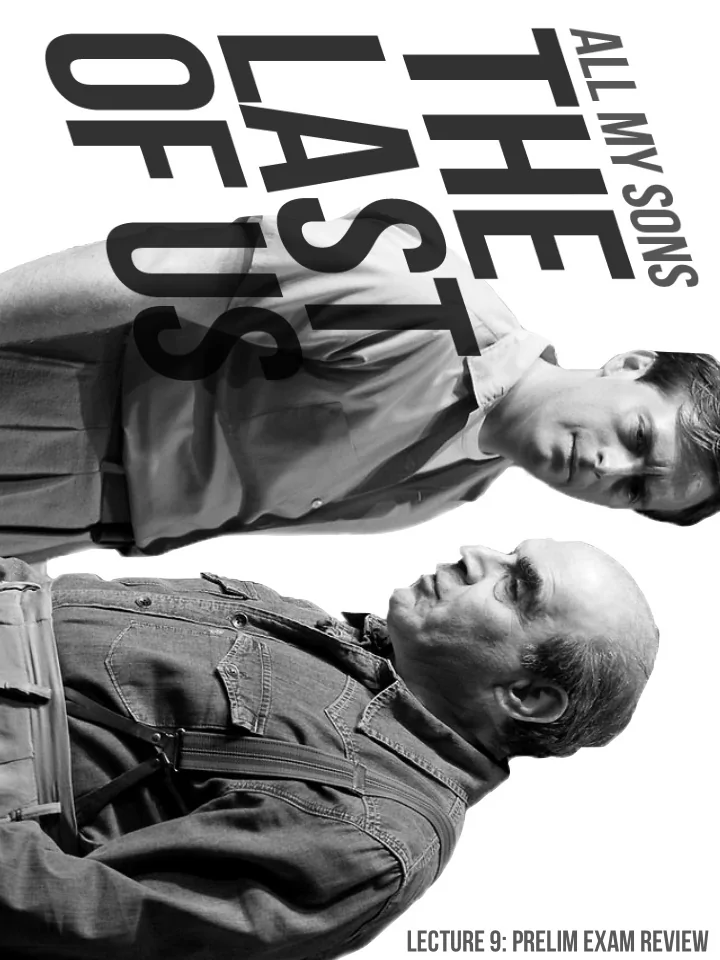

LECTURE 9: PRELIM EXAM REVIEW
A C T O N E The Home We Live In
MY THESIS Moving from laughter to disquiet, the passage establishes for the audience Joe Keller’s hamartia and supposed ‘dumb[ness]’ before stripping away most of his respectability. While we see his ‘goodness’ as a father and as a ‘forgiving’ ex- partner, the rising tension in the scene suggests that he is not as innocent as he seems, with his emphasis on the family telling us more about his sense of guilt.
If home is where Keller’s heart is, it is home — his blind devotion to the family — that will send him crashing against his son, his ‘only accomplishment’ later in the play. The passage indelibly marks Joe Keller as a pitiable tragic hero , who aware of his own misdeeds, fears being ‘crucified’ by Chris.
PARA 1 The opening of the passage presents Keller once again as an ‘ average Joe ’ whose good intentions and humility are traits the audience can empathise with.
‘dumb ones’ COLLOQUIAL UNEDUCATED LANGUAGE PEASANT-LIKE I been thinkin’ I ain’t brainy No kiddin’ take the garbage brooch stand and spit
PARA 2 In this light, we begin to see the figure of Joe Keller as a tragic hero , his ‘nobility’ counter- balanced by his guilty conscience.
George, I been thinkin’.. when I got so many friends here.. I could set George up here. I want [STEVE] to know that when he gets out he’s got a place waitin’ for him.
PARA 3 Despite his painstaking attempts to ‘make amends’, the protagonist’s guilt is clearly revealed through the shift in dramatic mood.
DIALOGUE - Ellipsis (...) and pauses - Repetition of short phrases sTAGE DIRECTIONS - Slight panic, speaks more nervously - a commanding outburst in high nervousness
PARA 4 Anticipating the explosive conflict between Chris and Keller later in Act T wo, this passage underscores the hamartia beneath Keller’s magnanimity.
PARA 5 It is in the light of Keller’s hamartia that we comprehend his impassioned insistence that ‘A father is a father’. To Keller, to be a ‘father’ and ‘daughter’ is to forgive and forget unconditionally.
I'm older than you and I know – a daughter is a daughter, and a father is a father. I OWE HIM A GOOD KICK IN THE TEETH BUT HE’S YOUR FATHER. I DON’T UNDERSTAND WHY SHE HAS TO CRUCIFY THE MAN.
A C T T W O The Choices We Make
My THESIS While Miller is writing explicitly against war profiteering, his stand on social responsibility is arguably far less absolute . This dialectic of ideas and values—between public and private morality, idealism and materialism, self-sacrifice and self-interest— is presented within the insoluble tension between Joe and Chris Keller.
The high-minded Chris appears to emblematise Miller’s call to be ‘responsible’ but the audience begins to question the sensibility of such idealism. The sympathetic portrayal of Joe Keller, whose role in the death of twenty-one pilots would ordinarily make him a villain, further challenges the play’s ‘Man for man’ creed. With the suffering caused by Chris’s moral vendetta, All My Sons interrogates whether it is really wise to be a ‘Jesus in this world’.
PARA 1 Miller’s portrayal of social responsibility seems to pivot on Chris’s unsullied idealism . His ‘heroic’ monologue near the end of Act One is emblematic of the ‘big principles’ (67) espoused by the play
C H R I S T - L I K E V I R T U E S MAN FOR MAN sacrifice
PARA 2 Lofty aspirations toward social responsibility are undermined by Jim and Sue as the play unfolds. Chris’s final confession reminds us that the principle of social responsibility must be balanced by a sense of pragmatism .
PARA 3 It would seem that the play is not wholly condemnatory of the materialism and self-interest that plagues the ‘average Joes’. Miller reflects that unqualified idealism is never within reach.
MATERIAL SELF-INTEREST IS INTER-WOVEN WITH FAMILIAL DEVOTION
PARA 4 The explosiveness of the Chris- Keller confrontation reflects the irresolvable tensions between social responsibility and familial loyalty. Chris and Larry’s moral absolutism becomes ironically destructive.
How could he have done that? Every day three or four men never come back and he sits back there doing 'business'. I tell you, Ann, if I had him there now I could kill him
PARA 5 Keller’s act of suicide denies us a sense of resolution and closure. Providing neither answers nor messages, the ending opens new wounds instead, leaving its audience in an uneasy position of making its own moral stand .
THE END OF KELLER IS MOURNED.
A MAN CAN’T BE A JESUS IN THIS WORLD (89)
A C T T H R E E The Path We Chose
You can be better ! There’s a universe of people and you’re responsible to it. Keller may be right to say that one cannot be a ‘Jesus’ in a world of individualistic, material pursuit. But this does not mean that we should not try.
ALL OUR SONS SOCIAL RESPONSIBILITy
Recommend
More recommend